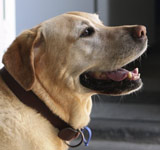Pet Articles
Feeding Senior Pets

As our pet cats and dogs get older, they start to develop their own set of age-related health problems in a similar way that we humans do. While some pets tend to slow down in their old age, others retain that same high level of energy that they had when they were young, and this can sometimes make it difficult for us to recognize that our senior pets may need a little extra care and attention.
As a general rule, dogs are considered to be seniors when they are between 7 and 12 years of age (large breed dogs will be considered seniors earlier, while small breed dogs won’t reach that designation until later in life). Cats are often considered to be seniors around 10 years of age. One of the easiest things we can do for our ageing pets is to consider switching them to a senior diet as a way of keeping them happy and healthy as they grow older.
As dogs and cats age, we start to see changes in their body composition. This is partly due to a decrease in their metabolic rates, and partly due to a decrease in lean body mass and a subsequent increase in body fat. What this means for our pets is that even though they are consuming the same amount of food as they were a few years ago, you might start to notice that they are gaining weight.
Your first instinct may be to simply decrease the amount of food they are being fed, but that might not be the best way to go. Several studies have shown that an increase in body fat may be because the body has a decreased ability to metabolize fats, which means that fats consumed from the diet are simply passing through the animal without being broken down and utilized. By reducing the amount of food that your pet receives, you are not actually decreasing the amount of fat he or she consumes; instead, you are simply reducing the proportion of available fat that your pet can use. A better way to alter the amount of fat your animal is receiving is to change the quality of fat, as this ensures that the fat being consumed will actually be utilized. A good quality fat would be one that is highly digestible and rich in essential fatty acids (EFAs).
To compensate for the increase in digestible fats, pet food companies will typically lower the proportion of calories that are contributed by fat. This helps to decrease the energy density of the diet, which can be a good thing for older pets that are now less active and thus require less energy from their food.
As mentioned earlier, older dogs require fats that are rich in essential fatty acids. This is because as they age, animals have a decreased ability to use these essential fatty acids, which, as the name suggests, are required by the body for normal function. One of the most important EFAs is gamma-linolenic acid (GLA) which is important for the maintenance of healthy skin and coats. As our pets get older, they have a harder time converting EFAs in our diet to GLA, and dogs are often deficient in GLA. One way to solve that problem is to give a GLA supplement with your dog’s food.
Other supplements may be beneficial as well to your senior pet. As with all types of supplements, it is a good idea to check with your veterinarian before deciding to give them to your dog or cat, in order to ensure that it is the best choice for your furry friend. A couple of supplement options include;
- FOS (fructooligosaccharides) are a type of prebiotic that help promote the growth of beneficial bacteria in your dog’s intestines, which helps promote a healthy digestive tract.
- Antioxidants such as vitamin E and beta-carotene can help to boost the immune system.
- Glucosamine (often combined with chondroitin) can be used in the treatment of osteoarthritis.
Another misconception that many people have is that protein levels in senior diets should be reduced in order to decrease the protein load filtering through the kidneys and thus decrease the risk of kidney failure. However, there have been several studies that have shown that protein requirements do not decrease with age, so there is no need to switch your pet to a protein-reduced diet just because he or she is getting older. This is especially true in cats, as they have a higher protein requirement than dogs. That being said, if you pet does have renal problems, you might want to switch them to a lower protein food, but that is something your veterinarian will likely recommend.
Most of the major pet food companies now have some kind of senior diet available for both dogs and cats, so the next time you’re picking up a bag of food for your senior pet, a diet formulated for specifically for older animals might be a great choice as an extra boost for your senior pet.
